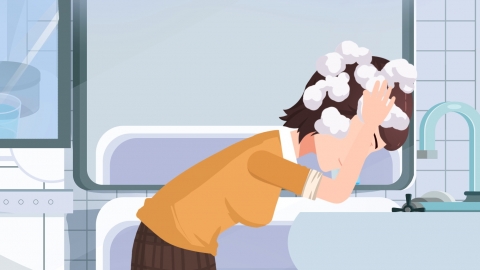What are the benefits and drawbacks of washing hair with plain water?
Generally speaking, the benefits of washing hair with plain water include providing natural cleansing, protecting the hair, regulating scalp sebum, reducing allergic reactions, and promoting blood circulation in the scalp. The drawbacks may include clogged hair follicles, hair loss, negative effects on hair texture and appearance, parasitic infections, and unpleasant odors. If discomfort occurs, timely medical consultation is recommended. Detailed analysis is as follows:

I. Benefits
1. Provides Natural Cleansing
Plain water can wash away dust and sweat from the scalp, offering a natural cleaning effect for both hair and scalp. This natural method does not rely on chemical detergents, thereby reducing potential damage caused by chemical substances to the hair and scalp.
2. Protects Hair
Washing hair with plain water avoids introducing various chemical ingredients found in shampoos, thus reducing scalp irritation and preventing residue from chemical hair products. It helps protect hair from damage. Additionally, it prevents over-cleansing, preserves the hair’s natural oils, provides protection, and leaves hair softer and shinier.
3. Controls Scalp Sebum
The scalp naturally secretes oil to maintain moisture in the scalp and hair. Washing with plain water removes small amounts of excess oil, helping regulate sebum production, prevent dandruff and scalp itching, and provide some moisturizing benefits to the hair.
4. Reduces Allergic Reactions
For individuals with sensitive scalps, the chemicals in shampoos may trigger allergic reactions. Washing with plain water reduces the risk of scalp irritation and minimizes allergic responses. It is a relatively safe cleansing method that effectively reduces allergy symptoms such as scalp itching and redness.
5. Promotes Scalp Blood Circulation
During the process of washing with plain water, gently massaging the scalp can enhance blood circulation, which supports hair growth. Improved circulation ensures adequate delivery of nutrients to the scalp and hair follicles, promoting healthier hair growth.
II. Drawbacks
1. Clogged Hair Follicles
While plain water can remove surface dirt from hair, it cannot thoroughly clean oils from the scalp and hair. Over time, this may lead to clogged hair follicles, impairing their normal respiration and metabolism, potentially causing folliculitis.
2. Hair Loss
Clogged follicles may trigger various scalp problems, including hair loss. When follicles are blocked, nutrients cannot be properly delivered, affecting their health and leading to brittle, easily broken hair, or even telogen effluvium (a type of temporary hair shedding).
3. Affects Hair Texture and Appearance
Since plain water cannot effectively remove scalp and hair oils like shampoo, long-term use may leave hair looking greasy. Inadequate oil removal can also cause dryness, leading to dandruff and scalp itching.
4. Risk of Parasite Infection
Washing with plain water may not effectively eliminate parasites from the hair, increasing the risk of infestation over time. For example, head lice are common parasites living on the scalp and hair. Without using specialized anti-lice shampoos or medications, plain water alone is unlikely to completely eradicate them.
5. Unpleasant Odor
Plain water cannot thoroughly remove sweat odor or other smells from the hair. It also fails to effectively eliminate scalp oils and dirt. Over time, these substances may decompose on the scalp and hair, producing an unpleasant smell.
It is recommended to maintain a regular lifestyle, avoid staying up late, keep a positive mood, and learn to manage stress, all of which can positively influence hair growth.






